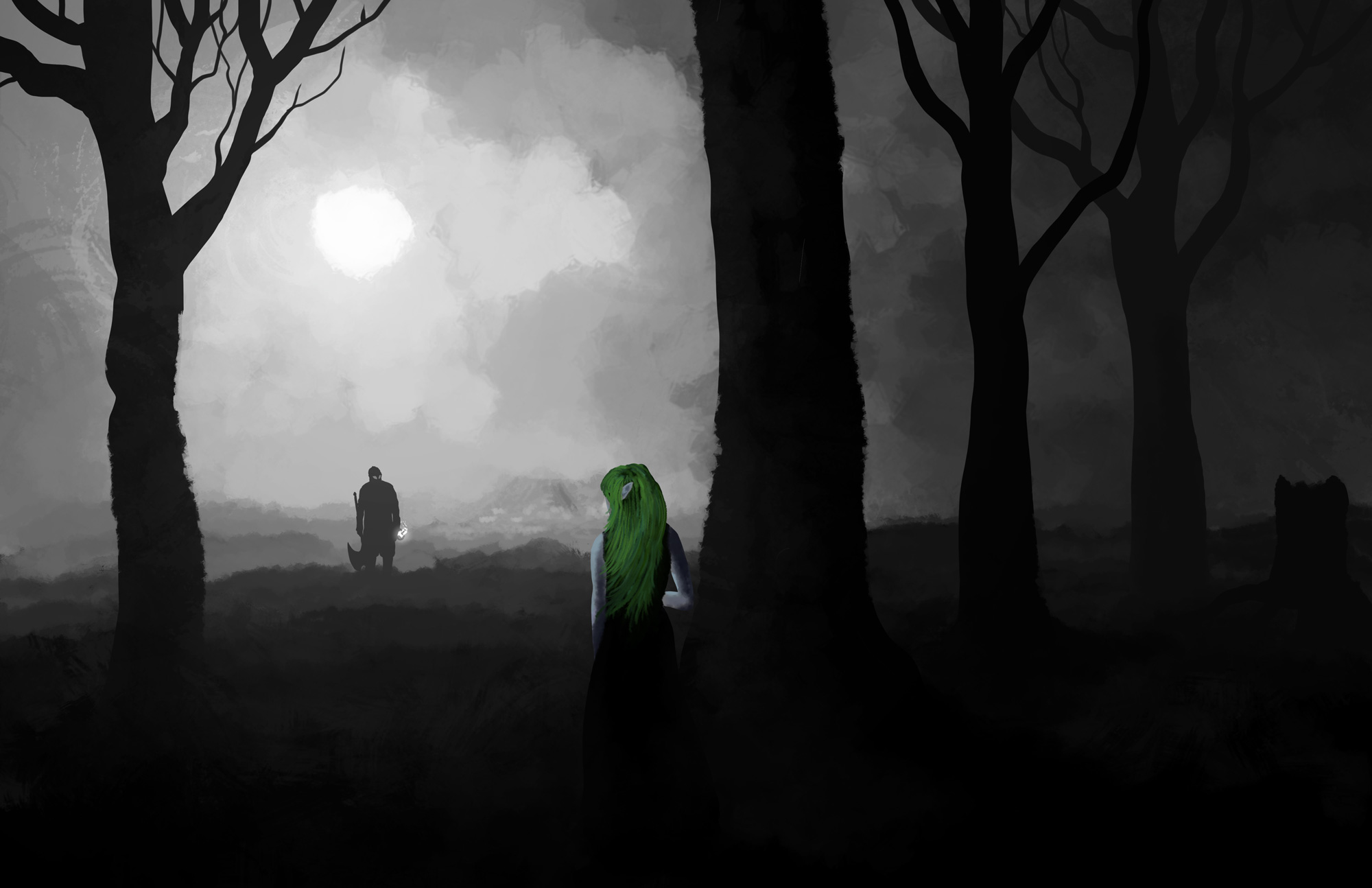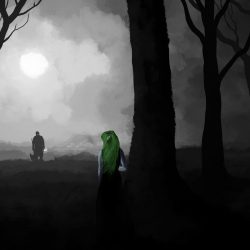Duels
Huldufolk are constantly in conflict with each other over the mortal world and their own place within Huldufolk society. It’s not unheard of for two Hidden People to spend weeks in struggle over the mortal world, breaking each other’s bones and leaving their blood in the street, only to grab a drink together at the end of every night of it. In most cases, it’s not personal, and the struggle doesn’t detract from wider Huldufolk business.
Yet some conflicts run deeper, and some even call out for blood. The Huldufolk are expressly forbidden from killing other Huldufolk, upon pain of death from the Patrons. When not in a time of Open War, this is even forbidden between members of The Banished and The Blessed. To resolve feuds, highly ritualized processes have developed over the millennia, with a focus on making participants seriously consider the importance of their dispute. The formality and process of the duel reinforces that Hidden Folk in conflict are still members of Huldufolk society, and must put the society’s purpose first.
Duel of Bruises
A conflict between two Huldufolk that requires a show-down, but no lasting bloodshed, is a Duel of Bruises. The winner has their way on the matter, and the loser must agree as such publicly. If the dispute was over mortal influence (such as deciding the result of a long running back-and-forth conflict over mortal actions), the result is conclusive — for a year and a day the loser cannot interfere with business related to that dispute. Any dispute which is a challenge over mortal influence is automatically considered a Bruise Duel — a Blood Duel is reserved for personal disputes between Huldufolk.
Traditionally a Bruise Duel takes the form of a one-on-one fight between the two Huldufolk. This is either fought using bare fists, or using ritualized short staffs.
In modern times, in addition to these options, the two individuals can agree on a contest — a test of wills, or abilities, or strength, etc. This is especially common when the dispute is over which is a deserving leader within their factions, and the two can come up with a relevant challenge that proves to all who is better suited for it. Regardless of a duel’s outcome, Huldufolk cannot be forced to pledge their Belief to anyone, and a challenge displaying their abilities is more persuasive (for most factions) than one displaying brute force.
If the two feuding Huldufolk cannot decide on terms on their own, their leaders (if they have one) will intervene to determine terms for the duel. This indicates a failure on the duelers’ part and a loss of face among the Huldufolk, a poor sign for their leadership potential for the future. As well, their leaders need not give their approval for a Bruise Duel, disputing the terms or even the duel itself — if the reasoning is flimsy, the dispute is fresh and without attempt at previous resolution, or the terms provide a severe disadvantage to one side. In the absence of a Huldufolk leader, a Patron themselves may intervene; for Bruise Duels this is extremely rare, given the relatively low stakes.
Assuming the conflict does not need to be resolved on that very day, the night before a Bruise Duel challenge the two Huldufolk spend the night with Hidden Folk of their community, boasting about each other (and sometimes themselves, if they can slip it in). Society admires boasts that can be taken as a jab at their opponent in a light hearted way, but look down on clear insults. Generally this night is spent with both Huldufolk drinking each other under the table.
After the duel is resolved, the two Huldufolk must exchange gifts (which may also be veiled jabs), before the loser affirms they have ceded their position on the matter.
Duel of Blood
A Bruise Duel is a regular occurrence, and generally fairly light hearted — the events surrounding a Bruise Duel are practically a festival celebrating Huldufolk tradition.
A Blood Feud, however, means there’s been a failure in Huldufolk society. Either two Huldufolk of the same side are unable to live with the other existing in the same community, or two Huldufolk across the aisle are so insistent on killing each other, outside a time of war, that they will shed the blood of one of their kind instead of uniting against their common enemies. It is a solemn event, and it requires the winner to be willing to make recompense for their personal vendetta costing society one of their own.
The ceremony is similar to that of a Bruise Duel, with no jubilance. The feud must be agreed to by both Huldufolk, along with their leaders (the leader can force a member’s acceptance if the duel is egregious enough). The night before the challenge, the two Huldufolk sit in vigil, facing each other. The challenge always occurs in a recessed ring, with the two Huldufolk fighting each other with ritual daggers (along with their magic of course), to the death — if either try to leave the ring, they are forcibly thrown back into it by the Huldufolk. One will die, the other will be a murderer.
After the conclusion, the winner must provide a gift to the the leader of the fallen Huldufolk, to provide some amount of recompense for their slain member, and beg forgiveness for the murder. In response, the leader must provide a task that the winner can complete to redeem themselves, commensurate with the importance of the Huldufolk killed. This task cannot clearly result in their death, or result in the death of another Huldufolk. It may, however, go against their own goals and allegiances. The severity of the task given is expected to be inversely proportional to the severity of the actions taken by the fallen Huldufolk leading up to the duel. If the dispute was over the fallen Huldufolk having heinously injured (or potentially killed) the mortal loved one of the winner, for example, the task is expected to be approximately the severity of a milk run. If the cause of the killing was eminently justified, a disproportionate penance can very well result in the intervention of a higher power — a higher Huldufolk leader, or potentially the Patrons themselves.
Legend tells of two feuding Greek Huldufolk leaders — of The Banished and The Blessed — who were in love with the same mortal woman and refused to back down. They took their blood feud to their Patrons, for there was no other leader to approve, and had their duel. The Leader of the Blessed was victorious, and when he begged the patron fallen Angel of the slain Banished’s faction for forgiveness, he was given a task: go to a land on the other side of the Bosphorus Strait, find the king in a gold and green crown, and kill him. The Huldufolk found this king, and discovered this kingdom on the brink of upheaval: a land struck by famine, disease, and inches from revolt. Disgusted with what he must do, the honorable Huldufolk killed this king, sending the land into a tailspin. The kingdom was destroyed by its own people. Their land destroyed, they took to piracy and raiding, spreading to the neighboring land. Onward and onward these “Sea People” rampaged through empires, taking down centuries of civilization, for want of one king, killed for repayment of one feud, over the love of one woman. Upon hearing that the Sea Peoples — now containing the combined anger and despair of the refugees of dozens of fallen cities — had reached Mycenae, the Leader of The Blessed jumped from the tallest rampart to his death.

